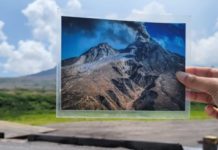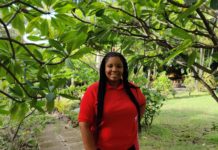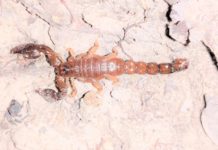I must admit I feel as though I have been remiss; I’ve been in Montserrat working on the Mountain Chicken Recovery Programme for a month now and haven’t yet taken the time to tell you about myself, my experiences and my role on the project.
This will be the first in a series of several introductions to current members of the team, so you can get an idea of the faces and the people behind the project out here in Montserrat.
Like so many before me, I was inspired to pursue a career working to protect and conserve the beautifully diverse wildlife around me after reading the books written by Gerald Durrell. I’d always had a passion for animals and wildlife, but these books allowed me to realise, at a young age, that one person with enough passion, and enough dogged determination, could turn that passion into a career, and in doing so, inspire and influence the lives of others, and the world as a whole, in a positive way.
One book in particular, ‘A Zoo in My Luggage‘, proved to me above all the others that an individuals dreams and ideals, which some people may laugh at, put down or discourage, can be realised through self-belief, determination and hard work. It was through reading Gerald Durrell’s books that I gained the courage to walk away from safe options and work towards being a part of something that can bring about positive change for all. As you read through this blog, you will notice that Durrell is a name that has featured very heavily in my life so far.
Motivated by Durrell, I decided to study animal sciences at university, with the hope that this would give me the skills necessary to pursue a career in wildlife conservation. Upon completing my studies, I realised I had gained a whole lot of book smarts but very little practical experience –experience that is necessary for working on projects in the field. As though in answer to this realisation, a golden opportunity presented itself to me in the form of a postgraduate diploma in endangered species recovery. Not only was this based working in the field on conservation projects in Mauritius, it was also taught by and involved working with Durrell Wildlife Conservation Trust and the Mauritian Wildlife Foundation. Moreover, it was a fully accredited course through DICE and the University of Kent.
Studying and working with Durrell and the Mauritian Wildlife Foundation allowed me to gain valuable hands-on experiences in endangered species recovery initiatives, and learn first-hand the challenges of conducting research projects in small island ecosystems that a conventional degree couldn’t. My time spent on this course also opened my eyes to the importance of being able to inspire, engage and educate others so that they too can see the importance of the work and how they might act to help.
After leaving Mauritius, this realisation inspired me to pursue work as a Lecturer and Education Officer at West Midland Safari Park in the UK, where I was facilitated in developing modules in ‘wildlife ecology and conservation’ and ‘managing volunteers’. I also gained valuable experiences in communicating the importance and value of wildlife and wildlife conservation to a whole myriad of audiences, from primary and secondary school students all the way through to retired adults.
I’m a firm believer that you should always seek to challenge and improve yourself, so when I saw the role of Research Assistant advertised by Durrell for the Mountain Chicken Recovery Programme; I knew it was a challenge that I couldn’t pass up.
So here I am! Research Assistant on the Mountain Chicken Recovery Programme – a role that allows me to combine my practical field, research and communication skills into my day-to-day work. To top that off, I’ve come full circle and am finally working for Durrell – theorganisation founded by the man that inspired me to pursue to my dreams and aspirations in the first place. When I stop and consider that, I really do have to pinch myself.
In my current role, I coordinate Durrell’s activities on the ground here in Montserrat, in preparation for the return of the Critically Endangered mountain chicken to its previous historic range. This includes: establishing native live-feed colonies (to feed the mountain chickens when they return); carrying out changes to the environment to make it unsuitable for the introduced fungal disease chytridiomycosis, which almost caused the extinction of the entire species; coordinating outreach initiatives for the project in the form of regular project updates on our social media sites and website; organising outreach to local schools; and engaging the Montserrat community in the project.
Needles to say, you should be expecting to hear a lot from me,and the rest of the team in the coming months.
It is a pleasure to meet you all! I hope you continue to follow us for the full journey of the mountain chicken’s return to Montserrat.







